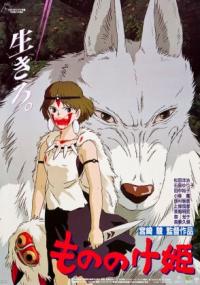 Princess Mononoke (もののけ姫, Mononoke-hime, “The Spirit Princess”) is our film club‘s title for August. It is an animated film written and directed by Hayao Miyazaki and released in 1997 through Studio Ghibli.
Princess Mononoke (もののけ姫, Mononoke-hime, “The Spirit Princess”) is our film club‘s title for August. It is an animated film written and directed by Hayao Miyazaki and released in 1997 through Studio Ghibli.
Princess Mononoke is a period drama with fantasy elements that was a critical and commercial success both in Japan and abroad. Like many of Miyazaki’s works, it emphasizes environmentalism as it follows a young warrior’s involvement in a struggle between natural spirits and the humans who are consuming the resources of the forest that these spirits inhabit. The film is thematically similar to Kurosawa’s similarly themed Dersu Uzala, which was our film club title last month.
For a more in-depth introduction, I would suggest turning to Wikipedia, which as so often with Japanese animation, has a fairly comprehensive article on the film. Also take a look at our recent discussion of Miyazaki’s latest, and possibly his last, film The Wind Rises, as well as our earlier discussion of Princess Mononoke itself, and whether Miyazaki could be considered the foremost heir to Kurosawa.
Thanks to its international success, Princess Mononoke is widely available on home video.
Next month we continue with the Kurosawa chronology, moving onto his 1980 film Kagemusha. A full schedule can be found on the film club page.






Vili, there is a missing link above to the discussion on The Wind Rises.
I can’t wait to watch this again – it is one of my all time favourite films, brilliant animation and a fascinating story.